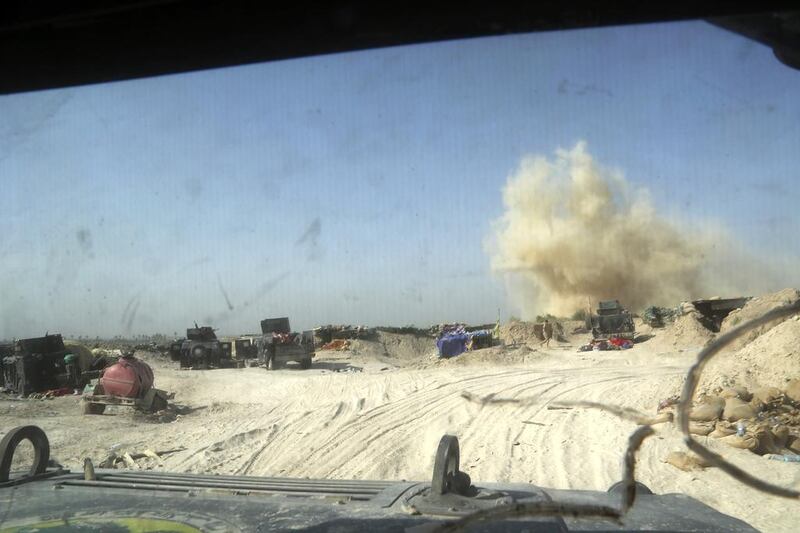BAGHDAD // At least 20,000 children are trapped inside Fallujah at risk of being recruited by ISIL extremists as Iraqi forces surround the city, the UN children’s fund warned on Wednesday.
Iraqi troops backed by US-led airstrikes and mainly Shiite militias launched an operation more than a week ago to recapture the city, which has been held by the extremist group for more than two years.
More than 50,000 people are believed to be trapped inside the Sunni majority city, about 65 kilometers west of Baghdad. Government forces have imposed a tight blockade on the city and ISIL militants are reportedly preventing residents from leaving.
Unicef on Wednesday issued a stark warning about the fate of the children caught up in the battle for Fallujah, saying they face a dire humanitarian situation, in addition to the risk of forced recruitment by ISIL.
The organisation called on all parties to “protect children inside Fallujah” and “provide safe passage to those wishing to leave the city.” The UN has said ISIL is using civilians as human shields.
On Wednesday, concerns over the fate of trapped civilians and resistance from ISIL meant Iraqi forces were stalled in their advance at the fringes of Fallujah.
Fighting also raged hundreds of kilometres further up the Euphrates Valley in Syria, as US-backed Kurdish and Arab fighters opened a new front against the extremists in the Manbij area on the Turkish border.
After a week of shaping operations aimed at sealing the siege of Fallujah, elite forces launched a new, more aggressive phase on Monday morning.
But they have so far been unable to reach the city centre and battle ISIL fighters in the streets of one of their historical strongholds.
“It would’ve been possible to end the battle quickly if protecting civilians wasn’t one of the foundations of our plan,” Prime Minister Haider Al Abadi told commanders on Wednesday.
Iraq’s parliament speaker, Salim Al Juburi, held talks with officials from Anbar province, where Fallujah is located, as well as commanders and tribal leaders on the humanitarian issue.
He discussed “ways of rescuing the families being held hostage and opening safe corridors for them,” his office said in a statement.
Inside Fallujah, trapped residents were under increasing pressure from worsening shortages and nervous ISIL fighters preparing for a desperate holdout.
No aid has reached Fallujah since September last year and residents have been living on dates, dirty water from the Euphrates and animal feed.
The Norwegian Refugee Council said another 300 families managed to flee areas around Fallujah in the past 24 hours, bringing to about 5,000 the number of people who escaped since the start of the operation.
Commanders said another factor slowing the operation is the resistance they are meeting from ISIL fighters.
A police colonel on the outskirts of Fallujah said “every time our forces try to push in, they encounter really tough defence systems set up by Daesh”.
The closest Iraqi forces have come to moving into the centre is from the south, where they entered a suburb of Fallujah but were pinned back by a massive counterattack on Tuesday.
Iraqi commanders say they have killed dozens of ISIL fighters since the start of the operation on May 22-23 but have been coy about releasing their own casualty figures.
Yet the number of coffins being sent back to some of Iraq’s southern provinces and of burials reported in the Shiite city of Najaf suggest that the anti-ISIL camp is also paying a heavy price.
“Since the start of the operation, we have received about 70 martyrs, probably a bit more,” said a member of the security forces posted outside Najaf’s Valley of Peace, the world’s largest cemetery, where many from Iraq’s Shiite majority bury their dead.
Officials in Basra said the southern province had lost 26 fighters from the Hashed Al Shaabi paramilitary force alone.
An official in Najaf province confirmed 12 deaths from the province.
Medics also reported many wounded from the battle for Fallujah. Since Monday, just two of the capital’s hospitals received 97.
Many Iraqi officers expect ISIL to put up more of a fight for Fallujah than some of the other cities they have lost in Iraq, such as Tikrit and Ramadi.
Fallujah is one of only two major cities they still control in the country – the other being Mosul – and it looms large in modern extremist mythology.
ISIL has been on the back foot in Iraq, losing much of the territory it seized in 2014.
But it has also come under growing pressure in the Syrian part of the “caliphate” it proclaimed two years ago.
* Associated Press and Agence France-Presse





